| Listing 1 - 10 of 17 | << page >> |
Sort by
|
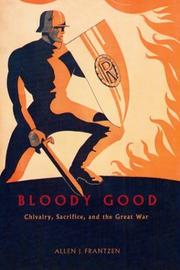
ISBN: 0226260852 Year: 2004 Publisher: Chicago University of Chicago press
Abstract | Keywords | Export | Availability | Bookmark
 Loading...
Loading...Choose an application
- Reference Manager
- EndNote
- RefWorks (Direct export to RefWorks)
History of Europe --- Social organizations --- anno 1910-1919 --- Chivalry. --- Masculinity. --- Sacrifice. --- World War, 1914-1918. --- Chivalry --- Masculinity --- Sacrifice --- World War, 1914-1918 --- European War, 1914-1918 --- First World War, 1914-1918 --- Great War, 1914-1918 --- World War 1, 1914-1918 --- World War I, 1914-1918 --- World War One, 1914-1918 --- WW I (World War, 1914-1918) --- WWI (World War, 1914-1918) --- History, Modern --- Burnt offering --- Worship --- Masculinity (Psychology) --- Sex (Psychology) --- Men --- Manners and customs --- Orders of knighthood and chivalry --- Civilization, Medieval --- Courtly love --- Crusades --- Feudalism --- Heraldry --- Knights and knighthood --- Europe --- Civilization.
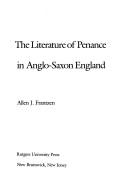
ISBN: 0813509556 Year: 1983 Publisher: New Brunswick Rutgers university press
Abstract | Keywords | Export | Availability | Bookmark
 Loading...
Loading...Choose an application
- Reference Manager
- EndNote
- RefWorks (Direct export to RefWorks)
Christian literature, English (Old) --- Civilization, Anglo-Saxon, in literature. --- English literature --- Penance in literature. --- Penance --- Penitentials. --- History and criticism. --- History and criticism --- History of doctrines --- Civilization, Anglo-Saxon, in literature --- Penance in literature --- Penitentials --- 265.6 --- Attrition --- Contrition --- Church discipline --- Forgiveness of sin --- Sacraments --- Absolution --- Confession --- Repentance --- 265.6 Boetesacrament. Biecht --- Boetesacrament. Biecht --- Penitential books
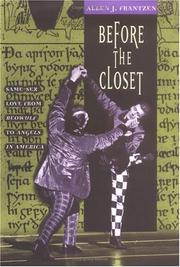
ISBN: 0226260917 Year: 1998 Publisher: London University of Chicago Press
Abstract | Keywords | Export | Availability | Bookmark
 Loading...
Loading...Choose an application
- Reference Manager
- EndNote
- RefWorks (Direct export to RefWorks)
Allen J. Frantzen challenges the long accepted view that the early Middle Ages tolerated and even fostered same-sex relations and that intolerance of homosexuality developed only late in the medieval period. Frantzen shows that in early medieval Europe, the Church did not tolerate same-sex acts, in fact it was an age before people recognized the existence--or the possibility--of the "closet." With its ambitious scope and elegant style, Before the Closet sets same-sex relations in Anglo-Saxon sources in relation to the sexual themes of contemporary opera, dance, and theatre. Frantzen offers a comprehensive analysis of sources from the seventh to the twelfth century and traces Anglo-Saxon same-sex behavior through the age of Chaucer and into the Renaissance. (Univ. of Chicago Press)
Anglo-Saxons in literature. --- English literature --- Gay men in literature. --- Homosexuality and literature --- Lesbians in literature. --- Love in literature. --- History and criticism. --- History. --- Anglo-Saxons in literature --- Gay men in literature --- Lesbians in literature --- Love in literature --- Literature and homosexuality --- Literature --- History and criticism --- History --- Kushner, Tony. --- Beowulf. --- Bjowulf
Book
ISBN: 9781783272457 Year: 2014 Publisher: Woodbridge The Boydell Press
Abstract | Keywords | Export | Availability | Bookmark
 Loading...
Loading...Choose an application
- Reference Manager
- EndNote
- RefWorks (Direct export to RefWorks)
Cooking --- Food habits --- History
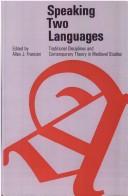
ISBN: 0585092931 9780585092935 0791405052 0791405060 1438403240 9781438403243 Year: 1991 Publisher: Albany State University of New York Press
Abstract | Keywords | Export | Availability | Bookmark
 Loading...
Loading...Choose an application
- Reference Manager
- EndNote
- RefWorks (Direct export to RefWorks)
English literature --- Literature, Medieval --- Civilization, Medieval --- British literature --- Inklings (Group of writers) --- Nonsense Club (Group of writers) --- Order of the Fancy (Group of writers) --- Medieval civilization --- Middle Ages --- Civilization --- Chivalry --- Renaissance --- History and criticism --- Theory, etc. --- Historiography. --- History --- LITTERATURE ANGLAISE --- LITTERATURE MEDIEVALE --- CIVILISATION MEDIEVALE --- ca.450-1100 (VIEIL ANGLAIS) --- HISTOIRE ET CRITIQUE --- 1100-1500 (MOYEN-ANGLAIS) --- HISTORIOGRAPHIE
Book
ISBN: 9781843839088 9781782042648 Year: 2014 Publisher: Woodbridge ;New York The Boydell Press
Abstract | Keywords | Export | Availability | Bookmark
 Loading...
Loading...Choose an application
- Reference Manager
- EndNote
- RefWorks (Direct export to RefWorks)
Book
ISBN: 1782043217 1782042644 1843839083 Year: 2014 Publisher: Woodbridge ; New York : The Boydell Press,
Abstract | Keywords | Export | Availability | Bookmark
 Loading...
Loading...Choose an application
- Reference Manager
- EndNote
- RefWorks (Direct export to RefWorks)
A fresh approach to the implications of obtaining, preparing, and consuming food, concentrating on the little-investigated routines of everyday life. Food in the Middle Ages usually evokes images of feasting, speeches, and special occasions, even though most evidence of food culture consists of fragments of ordinary things such as knives, cooking pots, and grinding stones, which are rarely mentioned by contemporary writers. This book puts daily life and its objects at the centre of the food world. It brings together archaeological and textual evidence to show how words and implements associated with food contributed to social identity at all levels of Anglo-Saxon society. It also looks at the networks which connected fields to kitchens and linked rural centres to trading sites. Fasting, redesigned field systems, and the place offish in the diet are examined in a wide-ranging, interdisciplinary inquiry into the power of food to reveal social complexity. Allen J. Frantzen is Emeritus Professor of English at Loyola University Chicago.
Food habits --- Cooking --- History --- To 1500 --- England. --- Cookery --- Cuisine --- Food preparation --- Food science --- Home economics --- Cookbooks --- Dinners and dining --- Food --- Gastronomy --- Table --- Eating --- Food customs --- Foodways --- Human beings --- Habit --- Manners and customs --- Diet --- Nutrition --- Oral habits --- Angleterre --- Anglii͡ --- Anglija --- Engeland --- Inghilterra --- Inglaterra --- Anglo-Saxons --- Group identity --- Implements.
Book
ISBN: 0470657626 1118255577 1118255585 1118255593 1118422090 Year: 2012 Publisher: Wiley-Blackwell
Abstract | Keywords | Export | Availability | Bookmark
 Loading...
Loading...Choose an application
- Reference Manager
- EndNote
- RefWorks (Direct export to RefWorks)
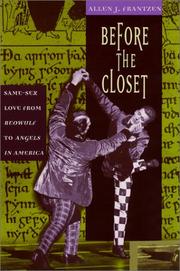
ISBN: 9780226260921 Year: 2000 Publisher: Chicago (Ill.) University of Chicago Press
Abstract | Keywords | Export | Availability | Bookmark
 Loading...
Loading...Choose an application
- Reference Manager
- EndNote
- RefWorks (Direct export to RefWorks)
Digital
ISBN: 9781782042648 Year: 2014 Publisher: Woodbridge The Boydell Press
Abstract | Keywords | Export | Availability | Bookmark
 Loading...
Loading...Choose an application
- Reference Manager
- EndNote
- RefWorks (Direct export to RefWorks)
Nutritionary hygiene. Diet --- Housekeeping --- England --- Japan
| Listing 1 - 10 of 17 | << page >> |
Sort by
|

 Search
Search Feedback
Feedback About UniCat
About UniCat  Help
Help News
News